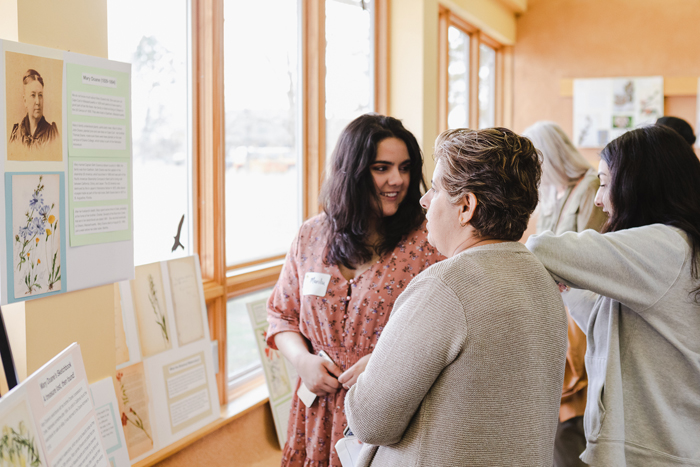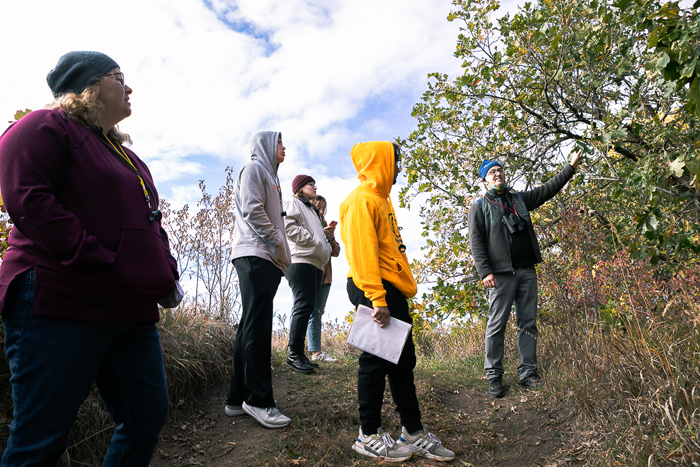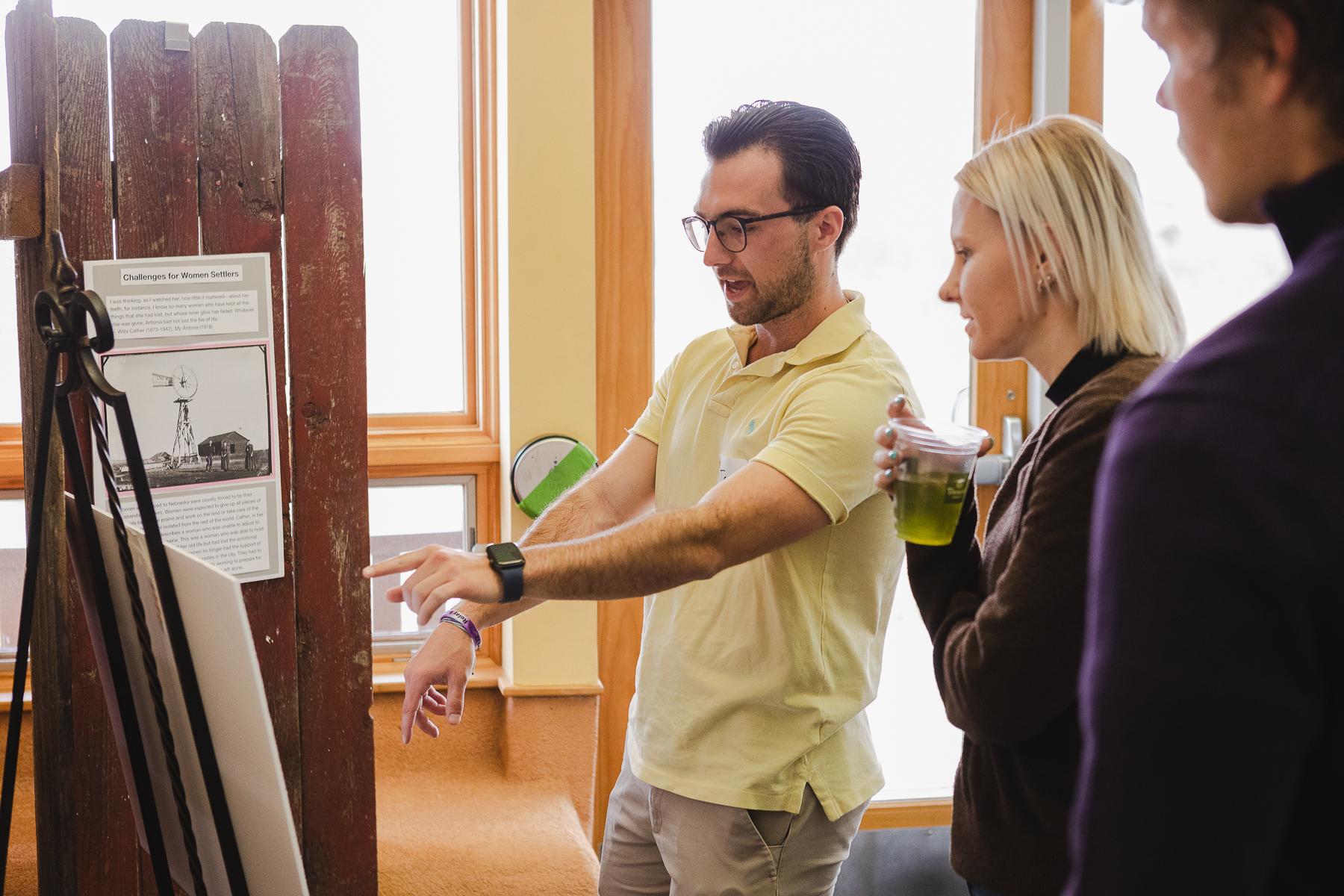
At Spring Creek Prairie Audubon Center (SCPAC), grasses are beginning to green and buds are starting to show on trees and bushes throughout the 850-acre tallgrass prairie preserve. And at the prairie’s visitors center, a project with roots dating back to 2020 is about to bloom, too.
“The Flora and Fauna of the Nebraska Tallgrass Prairie: Past and Present,” will open at 12:30 p.m. on Sunday, April 3 and be available throughout the month. The exhibit — and the wealth of research surrounding its creation — stems from a grant from the Council of Independent Colleges (CIC), “Humanities Research for the Public Good,” supported by the Andrew Mellon Foundation.

The goal of the grant is to promote undergraduate research drawing on institutional archives. Topics had to be of local interest and it had to be shared with the public. Which is how Dr. Kim Jarvis, professor of history, connected with Jason St. Sauver, senior education manager for SCPAC, in early 2021 to begin planning the exhibit and trips to the preserve with students enrolled in her class, HIS-337 American Women’s History.
“It’s a great way to share Doane’s archives with the public and promote Spring Creek’s work in protecting native species,” Jarvis said. “The course was a natural fit for the grant, to study women’s role in documenting nature. Throughout American history, women were often leaders of ecological research and conservation.”
Women like Mary Doane, sister of the university’s namesake, Thomas Doane. In the 1880s and 1890s, Mary created a portfolio and book of watercolors showing flora from the tallgrass prairie around the university and Crete. The materials were purchased by Doane University in 2010 when they resurfaced on Ebay after being lost around a century ago. As part of current research, the work offers valuable insight into botany at the time.
The exhibition also features information about regional plants gathered by another early Doane faculty member, Goodwin Swezey, who taught physical sciences including botany and astronomy. A cabinet of his collections remains in Doane’s botany lab along with several booklets he published on native flora.
The grant was initially received for the 2020-21 academic year, for Jarvis’s American Environmental History course, but was delayed due to COVID. Since then, Jarvis and Cali Biaggi, online learning and student services librarian, have been working to digitize the archival materials for the exhibit, which will compare the plants collected by Mary and Swezey to the flora of the modern tallgrass prairie.
Neither collection has previously been used as part of faculty- or student-led research.
Along with the overarching project to publicly share Doane’s archival materials, the four students in HIS-337 conducted their own research for the duration of the class. Two of them, Travis Handler and Anabelle Daugherty, continued working on research beyond the classroom as part of the grant.

Handler is a senior, majoring in political science and international studies. He is researching Black settlers in Nebraska and early sociological reactions, as well as Native American usage of the land and flora.
Both topics, he said, haven’t been part of the wider narrative in Nebraska. The historical information he has found is generally whitewashed and typically uses antiquated, offensive language.
“It’s difficult to find primary sources from the time rather than accounts written by white scholars, reporters, et cetera, after the fact,” he said.
Conducting and sharing this research also doesn’t ameliorate the violence of the past, he said, but bringing attention to the stories of Black settlers and the continued importance of the prairie for Nebraska’s Native populations is a good step toward wider understanding.
Handler said he’s enjoyed the breadth of topics discussed during Jarvis’s course and the chance to conduct research as an undergraduate.
“It’s a really special opportunity,” Handler said. “My favorite part of my college experience is researching and writing.”
Daugherty is a sophomore history major. As an artist herself, Daugherty’s research has focused on the watercolors created by Mary Doane and the role of women in Nebraska conservation activism during the late 1800s and early 1900s.
“A lot of them put their own gender into it,” she said. “It was their goal as ‘America’s mother’ to preserve the nation for the future, for their children.”
At this time, Daugherty said, women weren’t typically allowed in the spaces of politics at the time. However, being interested in nature was seen as socially acceptable — engaging in conservation was a form of nurturing and an extension of gendered stereotypes. And participating in conservation activism was a way to push at the boundaries of political influence during that time period.
The environmental research ties well into Jarvis’s interests, as well. Much of her research is tied to American environmental history, including the role of women in conservation. Jarvis has published several books on the topic that focus on New Hampshire, including From the Mountains to the Sea: Protecting Nature in Post-War New Hampshire (University of Massachusetts Press, 2020) and Franconia Notch and the Women Who Saved It (University of New Hampshire Press, 2007).
The grant and partnership with SCPAC provides her an opportunity to expand her knowledge to the ecology of the Nebraska landscape, as well as bring attention to the changing nature of the region.
“This grant shows the values of the humanities,” she said.

